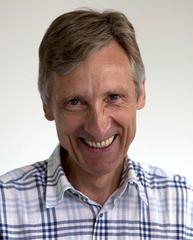URL: https://www.desy.de/news/news_search/index_eng.html
Breadcrumb Navigation
DESY News: DESY scientist to become research director at CERN
News
News from the DESY research centre
DESY scientist to become research director at CERN
DESY particle physicist Eckhard Elsen will be the next Director for Research and Computing at CERN, the European Organization for Nuclear Research in Geneva. Elsen was appointed by the designated Director General of CERN, the Italian particle physicist Fabiola Gianotti. The CERN council today approved Gianotti’s proposals for the new directorate. The other members are Frédérick Bordry as Director for Accelerators, Martin Steinacher as the new Director for Administration and General Infrastructure, and Charlotte Warakaulle as the new Director for International Affairs. Gianotti is due to take office in 2016. She will replace Rolf-Dieter Heuer, who was research director at DESY before taking office at CERN.

Particle physicist Eckhard Elsen will take office as CERN Research Director in January 2016.
As the project manager for several EU-funded research projects and as a member of many international committees, Elsen also knows his way around international research policies. In his role as chairman of the Large Hadron Collider Committee (LHCC), he gained deep insights into the challenges of the LHC experiments; this committee plans, discusses and reviews the entire research programme carried out at the Large Hadron Collider.
During his five-year term of office as Director for Research, Elsen will be in charge of the entire scientific programme and the scientific computing carried out at CERN. The Large Hadron Collider LHC has just begun its second operational run, during which it will achieve collision energies that are almost twice as high as those reached during its first run, when the Higgs particle was discovered. Many scientists are hoping that the coming years will lead to a better understanding of the Higgs mechanism and first signs of new phenomena, which might for example explain dark matter. In addition to the LHC, Elsen’s responsibilities will also include numerous smaller projects at CERN, as well as scientific computing (“big data”), a field in which the LHC makes tremendous demands and for which solutions are being developed under CERN’s management, solutions which can also be applied to other areas of science. At the same time, fundamental decisions on the future European and global strategy in particle physics will be made during his term in office.
“My aim is to ensure that particle physics in Europe and the world continues to stand on solid and broad foundations. CERN is currently the most important centre for particle physics. It would not have this role if it weren’t for the ideas contributed by other research centres and the constructive competition with them, as well as the young talents emerging from the participating universities. I would like to continue to strengthen CERN’s collaboration with all these different institutions,” says Elsen.
“As painful as it is for DESY to lose someone like Eckhard Elsen, we are also very proud that, for the second time in a row, one of our own scientists is to become a member of the CERN directorate,” says Joachim Mnich, Director in charge of Particle Physics and Astroparticle Physicsat DESY. “This shows that the people working at our research centre are extremely popular on the international stage. Eckhard has already demonstrated his leadership qualities when he was in charge of the H1 experiment, and I am looking forward to continue working with him closely in his new capacity.”
“DESY and the Helmholtz Association are a driving force in particle physics, and the biggest German partner in the ATLAS and CMS experiments at the LHC”, adds Helmut Dosch, chairman of DESY’s Board of Directors. “So I am especially pleased that Eckhard Elsen will be able to use his experience and competence to help shape the future of CERN and of international particle physics at the topmost level. Eckhard has my very best wishes for his new mission.”



